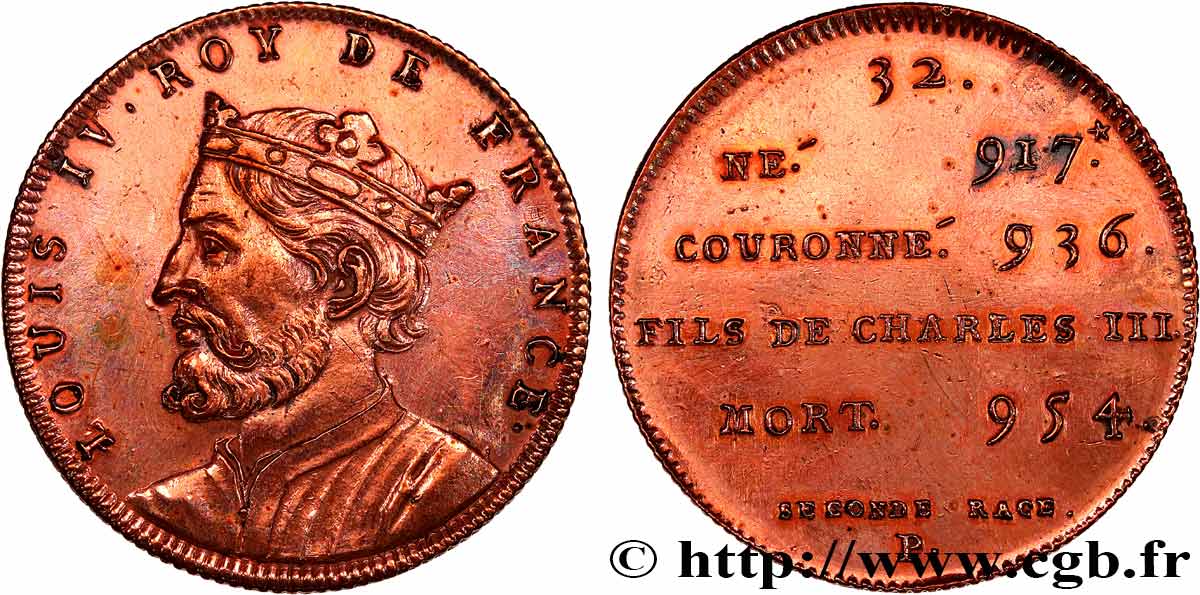fjt_743420 - SÉRIE MÉTALLIQUE DES ROIS DE FRANCE Règne de LOUIS IV - 32 - frappe d’origine, légère n.d.
40.00 €
Quantità
Aggiungi al carrello

Tipo : Règne de LOUIS IV - 32 - frappe d’origine, légère
Data: n.d.
Metallo : rame rosso
Diametro : 32 mm
Asse di coniazione : 12 h.
Peso : 12,86 g.
Orlo : cannelée
Grado di rarità : R1
Commenti sullo stato di conservazione:
Jeton nettoyé
Pedigree :
Exemplaire provenant de la Collection MARINECHE
Diritto
Titolatura diritto : LOUIS IV ROY DE FRANCE.
Descrittivo diritto : Buste imaginaire couronné et drapé à gauche.
Rovescio
Titolatura rovescio : 32 - NÉ 917* - COURONNÉ 936 - FILS DE CHARLES III - MORT 954 - SECONDE RACE / P..
Descrittivo rovescio : en sept lignes.
Commento
Louis IV dit d'Outremer (10 septembre 920 ou 921 – 10 septembre 954, Reims), fils de Charles III le Simple et d'Edwige de Wessex, est un roi des Francs (936-954) de la dynastie carolingienne.
Après la déchéance en 922 de son père le roi Charles III le Simple, sa mère et le prince Louis, âgé de deux ans, se réfugient en Angleterre (d’où son surnom d’Outremer), à la cour de son grand-père maternel Édouard l'Ancien, puis à celle de son oncle Æthelstan, rois de Wessex. Devenu l'héritier carolingien par la mort en captivité de Charles III (929), il est rappelé d'Angleterre par le puissant marquis de Neustrie Hugues le Grand afin de succéder au roi Raoul mort au début de l'année 936, laquelle marque alors le retour de la dynastie carolingienne.
Son règne riche en rebondissements nous est avant tout connu par les Annales de Flodoard puis plus tardivement par les Histoires de Richer de Reims. Une fois au pouvoir, Louis d'Outremer souhaite s'éloigner de Hugues le Grand devenu duc des Francs et seconde personnalité du royaume après le roi. Dans un premier temps il se lance à la conquête de la Lotharingie (939). Cette expédition est un échec et son beau-frère Otton Ier ne tarde pas à le soumettre en assiégeant la cité de Reims (940). Dans un second temps, après la mort du comte des Normands Guillaume Longue Epée, Louis IV tente de prendre à son compte le gouvernement de Normandie mais il est kidnappé par les hommes de Hugues le Grand (945).
Pour la suite de la biographie, voir http://fr.wikipedia.org/wiki/Louis_IV_de_France.
Louis IV, known as Louis d'Outremer (10 September 920 or 921 – 10 September 954, Reims), son of Charles III the Simple and Hedwig of Wessex, was a king of the Franks (936-954) of the Carolingian dynasty.
After the fall of his father, King Charles III the Simple, in 922, his mother and the two-year-old Prince Louis took refuge in England (hence his nickname Outremer), at the court of his maternal grandfather Edward the Elder, then at that of his uncle Æthelstan, King of Wessex.. Having become the Carolingian heir following the death in captivity of Charles III (929), he was recalled from England by the powerful Marquis of Neustria, Hugh the Great, in order to succeed King Raoul, who had died at the beginning of 936, which marked the return of the Carolingian dynasty..
His reign, rich in twists and turns, is known to us first and foremost through the Annals of Flodoard and later through the Histories of Richer of Reims.. Once in power, Louis d'Outremer wanted to distance himself from Hugh the Great, who had become Duke of the Franks and second most important figure in the kingdom after the king.. First he set out to conquer Lotharingia (939). This expedition was a failure and his brother-in-law Otto I was quick to subdue him by besieging the city of Reims (940). Later, after the death of the Count of Normandy, William Longsword, Louis IV attempted to take over the government of Normandy but was kidnapped by the men of Hugh the Great (945)..
For the rest of the biography, see http://fr. Wikipedia. org/wiki/Louis_IV_of_France
Après la déchéance en 922 de son père le roi Charles III le Simple, sa mère et le prince Louis, âgé de deux ans, se réfugient en Angleterre (d’où son surnom d’Outremer), à la cour de son grand-père maternel Édouard l'Ancien, puis à celle de son oncle Æthelstan, rois de Wessex. Devenu l'héritier carolingien par la mort en captivité de Charles III (929), il est rappelé d'Angleterre par le puissant marquis de Neustrie Hugues le Grand afin de succéder au roi Raoul mort au début de l'année 936, laquelle marque alors le retour de la dynastie carolingienne.
Son règne riche en rebondissements nous est avant tout connu par les Annales de Flodoard puis plus tardivement par les Histoires de Richer de Reims. Une fois au pouvoir, Louis d'Outremer souhaite s'éloigner de Hugues le Grand devenu duc des Francs et seconde personnalité du royaume après le roi. Dans un premier temps il se lance à la conquête de la Lotharingie (939). Cette expédition est un échec et son beau-frère Otton Ier ne tarde pas à le soumettre en assiégeant la cité de Reims (940). Dans un second temps, après la mort du comte des Normands Guillaume Longue Epée, Louis IV tente de prendre à son compte le gouvernement de Normandie mais il est kidnappé par les hommes de Hugues le Grand (945).
Pour la suite de la biographie, voir http://fr.wikipedia.org/wiki/Louis_IV_de_France.
Louis IV, known as Louis d'Outremer (10 September 920 or 921 – 10 September 954, Reims), son of Charles III the Simple and Hedwig of Wessex, was a king of the Franks (936-954) of the Carolingian dynasty.
After the fall of his father, King Charles III the Simple, in 922, his mother and the two-year-old Prince Louis took refuge in England (hence his nickname Outremer), at the court of his maternal grandfather Edward the Elder, then at that of his uncle Æthelstan, King of Wessex.. Having become the Carolingian heir following the death in captivity of Charles III (929), he was recalled from England by the powerful Marquis of Neustria, Hugh the Great, in order to succeed King Raoul, who had died at the beginning of 936, which marked the return of the Carolingian dynasty..
His reign, rich in twists and turns, is known to us first and foremost through the Annals of Flodoard and later through the Histories of Richer of Reims.. Once in power, Louis d'Outremer wanted to distance himself from Hugh the Great, who had become Duke of the Franks and second most important figure in the kingdom after the king.. First he set out to conquer Lotharingia (939). This expedition was a failure and his brother-in-law Otto I was quick to subdue him by besieging the city of Reims (940). Later, after the death of the Count of Normandy, William Longsword, Louis IV attempted to take over the government of Normandy but was kidnapped by the men of Hugh the Great (945)..
For the rest of the biography, see http://fr. Wikipedia. org/wiki/Louis_IV_of_France








 Segnalare un errore
Segnalare un errore Stampate la pagina
Stampate la pagina Condividi mia selezione
Condividi mia selezione Fai una domanda
Fai una domanda Consegnare / vendere
Consegnare / vendere
 Descrittivo
Descrittivo














